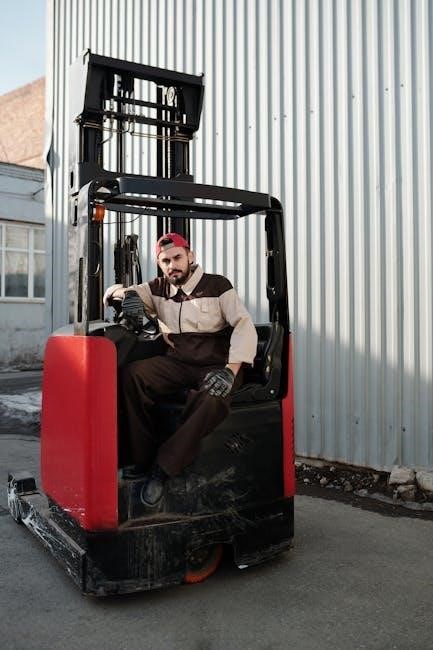Manual forklift rentals offer a cost-effective, flexible solution for businesses needing efficient material handling. They provide safety, productivity, and versatility for various operations, with options like pallet jacks and hand trucks available.
What is a Manual Forklift?
A manual forklift is a non-motorized material handling tool used to lift and move heavy loads. It relies on manual effort, such as pumping a handle or pushing, to operate. These devices are ideal for lighter loads and are commonly used in warehouses, construction sites, and other environments requiring efficient material movement. Manual forklifts are cost-effective, low-maintenance, and environmentally friendly, making them a popular choice for businesses seeking versatile and affordable solutions.
Why Rent a Manual Forklift?
Renting a manual forklift provides businesses with a cost-effective and scalable solution for material handling needs. It allows flexibility for short-term projects or seasonal demand without long-term investment. With options to rent by the day, week, or month, companies can adapt to changing workload requirements. Additionally, renting enables access to high-quality equipment without maintenance costs, ensuring operational efficiency and safety while keeping expenses manageable. This makes it an ideal choice for businesses seeking versatility and affordability.

Types of Manual Forklifts Available for Rent
Manual pallet jacks, hand trucks, and manual material lifts are popular options, offering efficient solutions for lifting and moving loads in various industrial and warehouse settings.
Manual Pallet Jacks
Manual pallet jacks are cost-effective tools for moving pallets, ideal for small to medium-sized operations. They are available in manual and motorized options, with weight capacities ranging from 2,000 to 6,000 lbs. These jacks are perfect for navigating tight spaces and are often rented for short-term projects. Companies like EquipmentShare and Sunbelt Rentals offer a variety of models, ensuring efficiency and safety in material handling. Regular maintenance ensures optimal performance during rental periods.
Hand Trucks and Dollies
Hand trucks and dollies are versatile, cost-effective tools for manual material handling. Ideal for small-scale operations, they are lightweight and portable, making them perfect for moving heavy loads in tight spaces. Available in various designs, they suit warehouses, construction sites, and retail environments. Companies like EquipmentShare and Sunbelt Rentals offer rentals, providing flexibility and efficiency for short-term needs. These tools are essential for businesses requiring manual lifting solutions without heavy machinery investment.
Manual Material Lifts
Manual material lifts are essential tools for safely lifting heavy loads up to 650 lbs. with lift heights ranging from 6 to 12 feet. Available for rent from companies like EquipmentShare and United Rentals, these lifts are ideal for warehouses, construction sites, and retail environments. They offer a cost-effective solution for businesses needing to handle heavy materials without investing in complex machinery, making them perfect for short-term projects or space-limited operations.
Cost of Renting a Manual Forklift
Rental costs vary based on weight capacity and duration. A 6,000 lbs forklift costs $199 daily, while a 30,000 lbs model is $700 daily, with additional fees for delivery and overtime.
Factors Affecting Rental Costs
The cost of renting a manual forklift is influenced by several factors, including the equipment’s weight capacity and rental duration. Higher capacity forklifts, such as those capable of lifting 30,000 lbs, cost more than smaller models. Rental periods can range from daily to monthly, with longer durations often reducing the daily rate. Additionally, the type of equipment (e.g., pallet jacks vs. manual lifts) and any additional fees for delivery or overtime will impact the total cost. Location and supplier can also affect pricing, making it essential to compare options.
Rental Duration and Pricing Options
Rental periods for manual forklifts vary, with options for daily, weekly, or monthly rentals. Pricing depends on the duration, with daily rates starting around $199 for a 6,000 lbs capacity forklift and $700 for a 30,000 lbs model. Weekly rates are $550 and $2,500, respectively, while monthly costs are $1,195 and $7,500. Longer rentals often reduce the daily rate. Delivery fees and overtime charges may apply, so it’s important to inquire about these when booking.
Advantages of Renting a Manual Forklift
Renting a manual forklift offers flexibility, cost savings, and access to modern equipment, allowing businesses to meet material handling needs without long-term commitments or upfront costs.
Flexibility in Rental Terms
Rental companies offer flexible terms, allowing businesses to rent manual forklifts for days, weeks, or months. This adaptability ensures companies can scale their fleet according to demand, whether for short-term projects or seasonal fluctuations. Many providers also offer overtime options and customized rental plans, making it easy to adjust rentals as operational needs change without financial strain.
Cost-Effective Solution
Manual forklift rentals provide a budget-friendly alternative to purchasing, reducing upfront costs. With options starting at $47 daily for pallet jacks, businesses can manage expenses efficiently. Rental plans often include maintenance, lowering operational costs. This approach avoids long-term financial commitments, making it ideal for short-term needs or smaller budgets while maintaining productivity and safety standards.
Access to Latest Equipment
Renting a manual forklift allows businesses to access modern, well-maintained equipment without the burden of ownership. Companies like EquipmentShare and Sunbelt Rentals offer state-of-the-art models, ensuring efficiency and safety. This option enables businesses to stay updated with the latest technology and features, enhancing productivity. Additionally, renting provides the opportunity to test new equipment before committing to a purchase, aligning with evolving operational needs and industry advancements.

Popular Manual Forklift Rental Companies
Leading providers of manual forklift rentals include EquipmentShare, United Rentals, and Sunbelt Rentals. They offer a range of manual pallet jacks, hand trucks, and material lifts, ensuring businesses can efficiently manage their material handling needs.
United Rentals
United Rentals is a top provider of manual forklift rentals, offering daily, weekly, and monthly contracts. Their fleet includes telehandlers, pallet jacks, and material lifts, designed for efficiency and safety. With a wide range of equipment, they cater to various industries, ensuring businesses can handle heavy loads effectively. Their rental services include delivery, maintenance support, and flexible terms to meet specific project requirements, making them a reliable choice for material handling needs.
Sunbelt Rentals
Sunbelt Rentals offers a diverse fleet of manual forklifts, including compact electric models, telehandlers, and warehouse equipment. Their machines are available in electric, gas, or diesel configurations, ensuring versatility for various applications. The company provides flexible rental plans tailored to specific project needs, with expert support to help clients choose the right equipment. Sunbelt Rentals focuses on maximizing efficiency and safety, making them a trusted partner for businesses seeking reliable material handling solutions.
EquipmentShare
EquipmentShare provides manual material handling rentals designed for efficiency and safety. Their fleet includes pallet jacks, dollies, and manual lifts, ideal for moving heavy loads. With state-of-the-art equipment and unparalleled customer support, EquipmentShare ensures productivity and reliability. Rentals are available for short-term or long-term projects, offering flexible solutions tailored to specific business needs. Their focus on safety and durability makes them a trusted choice for manual forklift rentals.

Safety Guidelines for Manual Forklift Rentals
Ensure safe operations with thorough inspections, proper training, and adherence to load limits. Regular maintenance and hazard awareness are crucial for accident prevention.
Pre-Rental Inspection Checklist
A thorough pre-rental inspection ensures safety and functionality. Check the manual forklift for proper load capacity, tire condition, brake performance, and hydraulic function. Verify all controls are responsive and free of damage. Ensure safety features like horns and lights are operational. Inspect for any structural damage or wear. Review the maintenance log and operator manual before use. Document any issues and address them with the rental provider to avoid liability. Completing this checklist helps prevent accidents and ensures compliance with safety standards.
Operating Safety Tips
Always wear proper safety gear, including a hard hat and steel-toe boots. Ensure the load is balanced and within the forklift’s capacity. Operate at a safe speed and avoid sudden movements. Use horns when approaching intersections or blind spots; Keep the work area clear of obstacles and ensure proper lighting. Never exceed the load limit or operate on uneven terrain. Follow all safety guidelines outlined in the operator manual and maintain three points of contact when entering or exiting the forklift.

How to Choose the Right Manual Forklift
Selecting the right manual forklift involves assessing load capacity, workspace conditions, and specific material handling needs to ensure optimal performance and safety in your operations.
Assessing Your Material Handling Needs
Evaluating your material handling needs is crucial for selecting the right manual forklift. Consider the weight, size, and type of loads, as well as the workspace environment. Determine if the equipment will be used indoors or outdoors and the required lift height. Additionally, assess the frequency of use and the number of operators to ensure the chosen forklift meets both operational and safety standards effectively.
Matching Forklift Capacity to Your Load
Matching the forklift’s capacity to your load ensures safe and efficient operation. Consider the load’s weight, size, and shape, as well as the lift height required. The forklift’s rated capacity should exceed the load’s weight to prevent instability. Additionally, account for attachments or accessories that may affect capacity. Always consult the equipment’s manual for specific guidelines and ensure operators are trained to handle the load within these limits.
Rental Process and Agreement
The rental agreement details the equipment, rental period, and terms. It outlines responsibilities, costs, and payment terms, ensuring clarity and mutual understanding between the renter and provider.
Steps to Rent a Manual Forklift
To rent a manual forklift, start by selecting the right equipment based on your needs. Browse rental catalogs online, choose your rental duration, and request a quote. Review and sign the rental agreement, ensuring all terms and conditions are clear. Arrange for delivery or pickup, and ensure proper inspection before use. Many companies like EquipmentShare, United Rentals, and Sunbelt Rentals offer streamlined processes and tailored rental plans for convenience.
Understanding the Rental Agreement
A rental agreement outlines the terms, including equipment details, rental duration, and pricing. It specifies responsibilities for inspection, maintenance, and return conditions. Ensure to review overtime charges, delivery fees, and damage policies. Clarify any penalties for late returns or equipment misuse. The agreement may also include warranty details and liability clauses, ensuring both parties are protected. Always ask questions to avoid unexpected costs and ensure compliance with the terms provided.
Maintenance and Support Services
Rental companies provide regular maintenance and emergency support to ensure equipment reliability and address issues promptly, minimizing operational downtime and safeguarding productivity.
Regular Maintenance by Rental Companies
Rental companies typically handle regular maintenance for manual forklifts, ensuring equipment remains in optimal condition. This includes routine checks, servicing, and addressing wear and tear. Hydraulic systems, lift chains, and tires are regularly inspected and maintained to prevent breakdowns. Lubrication of moving parts is also performed to ensure smooth operation. These services help extend the equipment’s lifespan and maintain safety standards, giving renters peace of mind.
Emergency Support and Repairs
Rental companies often provide 24/7 emergency support for manual forklift repairs, ensuring minimal downtime. Skilled technicians address issues like hydraulic malfunctions or tire damage promptly. On-site repair services are available, and companies like EquipmentShare and Sunbelt Rentals offer quick response times; This support ensures operations continue smoothly, minimizing delays and maintaining productivity. Renters can rely on these services for urgent fixes, backed by expert knowledge and reliable solutions.
Common Mistakes to Avoid
- Underestimating load capacity can lead to equipment damage or safety hazards.
- Neglecting pre-rental inspections often results in unseen issues during operation.
Underestimating Load Capacity
Underestimating load capacity is a critical mistake that can lead to equipment damage or safety hazards. Always consult the manufacturer’s manual for exact weight specifications. Renting a forklift with insufficient capacity can result in mechanical failure or accidents. Ensure the forklift’s rated capacity matches your load requirements to maintain operational safety and efficiency. This simple oversight can lead to costly repairs or downtime, emphasizing the importance of proper planning and equipment selection.
Neglecting Safety Inspections
Neglecting safety inspections is a risky oversight that can lead to accidents and equipment damage. Always perform a pre-rental inspection and daily checks to ensure proper function. Overlooking worn tires, faulty brakes, or hydraulic leaks can result in operational hazards. Regular inspections are crucial for maintaining safety, reducing downtime, and ensuring compliance with regulations. Prioritize safety checks to avoid potential risks and ensure smooth material handling operations during your rental period.